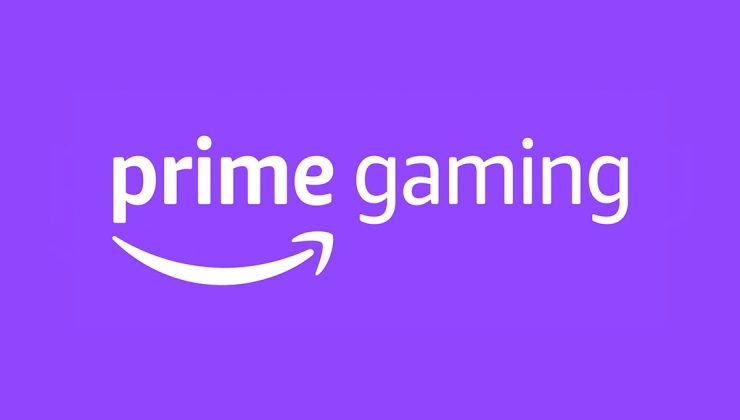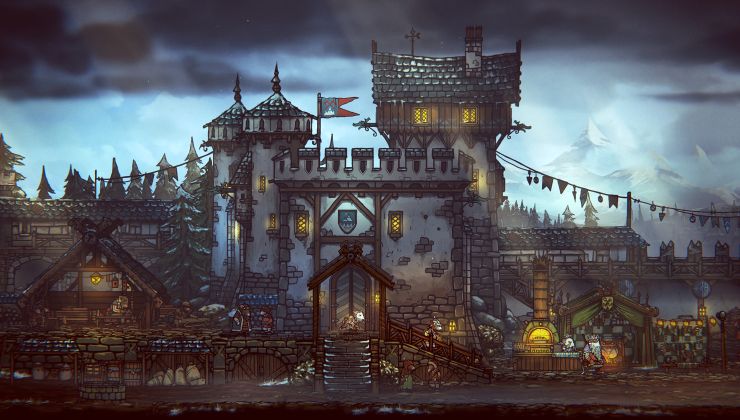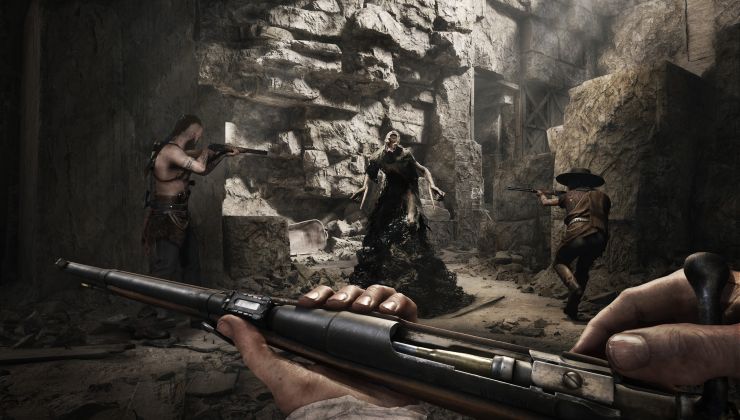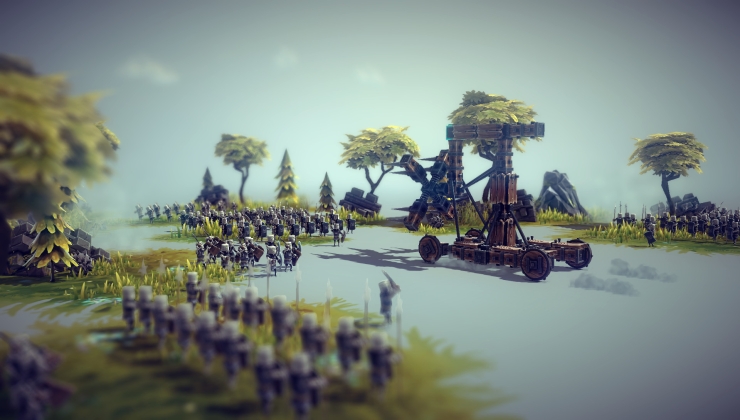Return to Part 1: Dumpster Diving
Continued from Part 12: In Tremendous Pain
It is rare for Linux to see support from both sides of an industry battle, but that is exactly where we were with the release of Quake III Arena and Unreal Tournament. With both games aiming to package the full breadth of the online multiplayer shooter experience into a standalone title, the competition between the two was fierce. I myself have always favoured the solid craftsmanship of Quake III Arena, but the greater variety in Unreal Tournament has to be admired.
Some versions ship with a Linux installer already on the disc, but with the Game of the Year Edition you need to download the ut-install-436-goty.run setup script which grants all of the official patches. This proved a smooth process even when swapping between CD-ROMs, but the installer can be too opaque, not telling you outside of the terminal output that it is busy decompressing maps. This can take some time, making it easy to assume that the setup has stalled.
Unreal Tournament only came alive when I set the XFree86 server to 32 bit colour depth, not just improving the visuals and clearing up the numerous Z Buffer artifacts, but also helping to level out the game performance. From there I tweaked the UnrealTournament.ini file, setting "NoDynamicLighting" to "True" and "UseGammaExtension" to "1", with "Coronas" and "VolumetricLighting" set to "False". Like this the game was playable and still looked better than on first launch.
Even with those changes I never felt that it reached a comfortable level of performance, despite my hardware matching the requirements listed on the box. To catch up to what I achieved with Quake III Arena I had to escalate to the point of turning off all lighting entirely, leaving every map looking grey and uninteresting for just a marginal speed increase. With OpenGL on Linux at least, Unreal Tournament does scream for the power of a Radeon or a GeForce graphics card.
One of the benefits of Glide was its lower CPU overhead, so it is also possible a more powerful processor may have helped. Regardless, I am under no doubt that the game would still run smoother paired with a Voodoo card under Glide, as all of the contemporary coverage implies. In general my Rage 128 Pro has been great under Windows 98, but I have been feeling far more of a pull back towards the old 3dfx world order on Linux.
Unreal Tournament benefited from running at 32 bit colours with Direct3D as well, with Windows 98 giving a better showing than Linux did. In the City Intro timedemo Windows 98 managed an average of 40 FPS as opposed to just 30 FPS on Linux with a lot of churn when using my optimized settings. For the sake of argument I also tried the community made UTGLR 3.6 enhanced OpenGL renderer, but it proved heavier than the default SDL implementation on period hardware.
While I have played my fair share of deathmatches, I had never actually played through the single player campaign before. Someone spent a great deal of time writing the flavour text, leaving it a shame that it has next to no relevance to the actual gameplay. The bots in Quake III Arena show more individual personality through their dialogue and character designs than the bots in Unreal Tournament do, even with that one character blurb which is a dig at economists.
The few exceptions are the Skaarj Hybrids and those found in the Challenge ladder, who do exert more of a presence on the battlefield. I will admit to missing out by not trying Domination or Assault before, as it is here with team and objective based games that Unreal Tournament does excel over its competition. I also appreciate the tutorials made for each mode, although they neglect to inform you how to issue orders to your team until the final Assault tutorial.
I did encounter some bugs, such as sound effects interrupting one another and a few hardlocks. Like with Quake II these were sporadic but tend to cluster on certain maps, with the worst offender being "AS-Overlord". I came within 26 seconds of winning before the game crashed, and it kept freezing. My solution was the same as with the "Water Treatment Plant" level in the first Quake II mission pack, namely playing through the map in software rendering instead.
Even without a source code release, community support for Unreal Tournament has been stellar, with the OldUnreal project under the blessing of Epic Games being the current torchbearer. Thanks to them the game still runs great on modern Linux distributions, being easier to setup than even Unreal Tournament 2003 and Unreal Tournament 2004 now are, the latter two seeing Linux ports thanks to Ryan Gordon. The community even managed to bring over what came before it.
Carrying on in Part 14: Return to Na Pali
Return to Part 1: Dumpster Diving
[http://www.ut-files.com/index.php?dir=Patches/&file=ut-install-436-GOTY.run](http://www.ut-files.com/index.php?dir=Patches/&file=ut-install-436-GOTY.run)
The UTGLR 3.6 renderer can be grabbed here:
[http://www.ut-files.com/index.php?dir=Video_Renders/OpenGL/&file=utglr36_for_linux.zip](http://www.ut-files.com/index.php?dir=Video_Renders/OpenGL/&file=utglr36_for_linux.zip)
A review of the game by Matt Matthews for Linux Games is archived here:
[https://web.archive.org/web/20001101213320/http://www.linuxgames.com/reviews/ut.html](https://web.archive.org/web/20001101213320/http://www.linuxgames.com/reviews/ut.html)
A review of Unreal Tournament for linuxgaming.net is archived here:
[https://web.archive.org/web/20030530121235/http://linuxgaming.net/modules.php?name=Reviews&rop=showcontent&id=13](https://web.archive.org/web/20030530121235/http://linuxgaming.net/modules.php?name=Reviews&rop=showcontent&id=13)
A detailed retrospective of the game by LGR including on Linux can be viewed here:
[https://www.youtube.com/watch?v=XRF06DpQE0c](https://www.youtube.com/watch?v=XRF06DpQE0c)
And my raw Unreal Tournament timedemo data can be found here:
[http://icculus.org/~hamish/dianoga/ut99-timedemos.txt](http://icculus.org/~hamish/dianoga/ut99-timedemos.txt)
Last edited by Hamish on 12 Feb 2023 at 2:30 am UTC
If I ever find time to dig mine out, I would give it a try.
The requirements on those should be fairly low, and it would be impressive to see how they run on a Pentium 2 or 3.Based on my own experiences trying to get certain Indie games working on my brother's older but still much newer laptops you might be surprised. Despite how they look they are not programmed anywhere near as efficiently as actual retro titles. It still might be worth a go though.
Is Sim City 3000 on the to-do list? :pIt definitely would be if I had the Linux version of it which I do not have at present sadly. I really should play a simulation or strategy title at some point just to break up all of the first person shooters, but they really did dominate the Linux gaming scene at the time and for a good while afterwards too.
It does strike me that Loki Software never ported any cRPGs over to Linux. We did get Neverwinter Nights from BioWare themselves in 2002 at the very least. Things have improved a great deal there.
There actually were quite a few strategy games, even though none of them were classic RTS titles (Theocracy might be the closest, would be great if you made a retrospective on that, even if it would be just complaining about how buggy it is).Theocracy is a fantastic suggestion that had slipped my mind until now. The game has to be ran at 16 bit colours and also has issues with newer glibc versions, so a perfect fit for Dianoga. It also seems to have been sold like Terminus with the Linux version included alongside the Windows release, so it should not be that hard to find.
At first it looked like the only place selling a dedicated Linux release was Amazon Germany, so I was considering sending you a private message about it, but I think I can get it in English instead.
Case in point: SimCity was released for Linux around the same time as DOOM (both shareware). I have yet to find out which of the two was the first commercial game released for Linux.My understanding is that SimCity was a UNIX port that just happened to work on Linux, rather than a dedicated port to Linux such as Dave Taylor did for Doom, Quake, and Abuse. An academic distinction though.
The joys of playing around with X settings manually back then! Wait...was that before X.org? I think it was still XFree86 back then.As mentioned in the article, my install of Red Hat Linux 7.3 Valhalla is still using XFree86 at least. And powering just a 15" LCD monitor playing games at a paltry 640x480 to boot.
A great game
Will there be a Rune review on legacy and modern hardware?
I've played Rune on modern hardware. To get it to work correctly I had to use the taskset command. The game does not seem to like multi-core CPUs and acts extremely weird unless forced to a single CPU.
I do own Rune and I have played through the demo on Dianoga, but it is too much for the hardware. Even on Windows 98 it struggles. I do have some plans for it in the future but that is beyond the scope of what I am covering right now.Will there be a Rune review on legacy and modern hardware?I've played Rune on modern hardware. To get it to work correctly I had to use the taskset command. The game does not seem to like multi-core CPUs and acts extremely weird unless forced to a single CPU.
As for my running the game on modern Linux, I already detailed that in a previous article:
https://www.gamingonlinux.com/2020/02/the-sad-case-of-unreal-engine-1-on-mesa-and-linux-in-2020/
OldUnreal saved the day for Unreal Tournament but Rune is still difficult.
Yeah. I've been known to bitch about how these games claim they are 'retro', and specifically the ones that claim they are '8-bit' when the developers know damn well that an 8bit or 16bit system would never be able to play such a thing. They should refer them simply to Pixel Art games. Because that is what they are. Some of them have particle physics that would just crush any older system.The requirements on those should be fairly low, and it would be impressive to see how they run on a Pentium 2 or 3.Based on my own experiences trying to get certain Indie games working on my brother's older but still much newer laptops you might be surprised. Despite how they look they are not programmed anywhere near as efficiently as actual retro titles. It still might be worth a go though.











 How to set, change and reset your SteamOS / Steam Deck desktop sudo password
How to set, change and reset your SteamOS / Steam Deck desktop sudo password How to set up Decky Loader on Steam Deck / SteamOS for easy plugins
How to set up Decky Loader on Steam Deck / SteamOS for easy plugins
See more from me